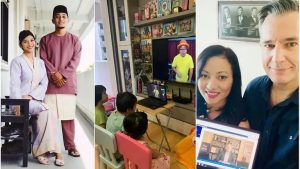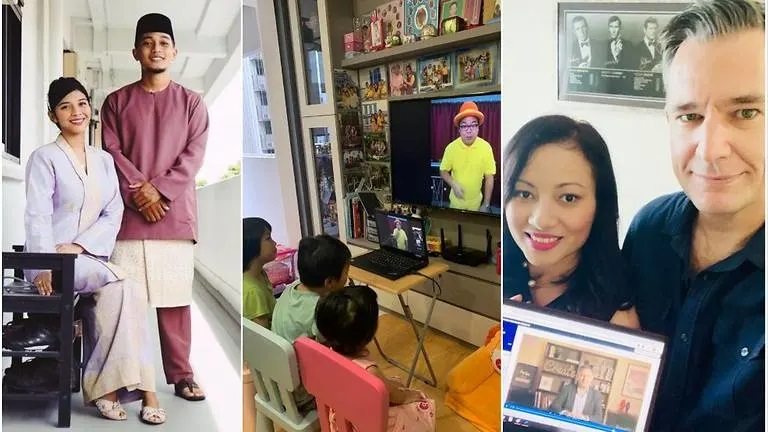
From left: Ms Siti Nadzirah Hassan and Mr Khairul Amri Mohd Sidik of Picneeds; a Mr Egg Magic show; Ms Liyana Stuart and Mr Mark Stuart of Anagram Group.
SINGAPORE: It’s only 4am in Kembangan but Ms Liyana Stuart is already up. She is on one of her early-morning walks, a ritual she has observed daily since the start of the COVID-19 outbreak.
On these walks, Ms Liyana will buy coffee and sometimes groceries, and by 5am, she’s back home and her work day begins. For the next hour or so until her children wake up, it is quiet in her home office save for the clickety sounds of the mouse and keyboard as she reads and replies emails.
Ms Liyana is a client relations director at corporate training firm Anagram Group. She and her husband Mark, who is the head trainer, founded the company seven years ago. Until the “circuit breaker”, the duo worked out of a co-working space in Dhoby Ghaut, with Mr Stuart travelling an average of 10 times a month to deliver his workshops in person.
But in February, as information about the novel coronavirus trickled in, their bookings trickled away.
“Our once-full, in-person training calendar was left empty as we experienced cancellations. First the cancellations came from Singapore, then Asia, followed by the Middle East as the virus spread around the world,” Ms Liyana told CNA. The loss of income was “devastating”, she added.
Fortunately for the duo, they had already begun working on a “hybrid solution” that combined in-person training workshops in Singapore with online webinars for participants in other parts of Asia.
Anagram had introduced it as a “more cost-effective mode of training” that brought regional teams together while saving on travel, accommodation and printing costs.
“We never imagined webinars would be the default mode of training in 2020 and this would provide valuable learning for what was about to happen this year,” said Ms Liyana.
For the launch, Anagram first approached the long-term clients who were most receptive to and supportive of the new options.
“Some clients have been slower to convert to virtual training as they want to wait and see if in-person is going to resume soon or they still hold the belief that virtual training can’t be interactive,” said Mr Stuart.
Anagram’s first webinar went live on Mar 19 and since then, it has held more than 20 sessions for clients including banks, international schools and multinational corporations (MNCs) on topics like Innovation and Design Thinking, and Leadership in the Digital Age. And the requests keep coming.
“Over the past month we’ve experienced a larger increase in enquiries as clients get more comfortable with online options and accept that this might be the status quo until 2021,” said Mr Stuart.
”MURPHY’S LAW IN ACTION”
For Anagram, survival meant making changes to its business model, but for another husband-and-wife team, the very nature of their business had been ripped apart and as the pandemic wore on, their optimism began to wear off.
Ms Siti Nadzirah Hassan and Mr Khairul Amri Mohd Sidik are the founders of Picneeds, which evolved since 2014 from a bespoke private picnic planner to a full-fledged events company taking on weddings and events such as Twilight Feast and Late Night with SAM.
When they first caught wind of the virus, the company began encouraging clients to have intimate picnics in parks, away from the crowds, with each set-up wiped down and hand sanitisers provided. Clients who had pre-paid were allowed to postpone their events to another date within the year. In March, when gathering restrictions were announced, the company moved to convert existing large-scale wedding bookings into home solemnisation packages. Plans to host what would have been its biggest project, a local music festival, were scrapped.
“(That event) gave us hope that 2020 would be the year of growth. We were ambitious but it was a challenge we had been ready to take,” Ms Nadzirah told.
But the worst was yet to come.
“When circuit breaker measures were introduced in early April, we had to cease all operations. It was truly heartbreaking and difficult, not only from the financial perspective, but also emotionally because it dawned on me that we had both become jobless overnight.
“From having our schedules filled, with days starting in the morning and ending past midnight, we were suddenly sitting on the floor of our home with no real plan for the future,” said Ms Nadzirah.
Eventually, they got to planning again and came up with the DIY Picneeds rental kit. The idea was that customers would receive a curated collection of decorative items that they could easily use to set up their own events for special occasions at home.
The response was “pretty encouraging”, said Ms Siti Nadzirah. “We had a number of bookings within days of announcing on social media.”
But amid the hope, there remained a sense of civic responsibility that drove Ms Nadzirah to check with the authorities on their ability to continue operating in this way during the circuit breaker. The answer was no, they could not as it was not an essential business.
“We offered refunds and the option to turn their booking into credit for use in the future. Most opted for the refunds and we ended up back to square one,” said Ms Nadzirah.
By then, Mr Amri had started work as a food delivery rider, but Ms Nadzirah continued to feel “hopeless” as the days went by, worried about overheads that were still running, such as warehouse rental, the Picneeds van, as well as their own home expenses and basic daily necessities.
“Having invested a large portion of our revenue into new inventory, we were not in a very financially secure place. Besides that, the anxiety was real – losing the job that you have built from scratch and actually enjoyed doing was a mental fight,” she said.
When the circuit breaker was extended, Ms Nadzirah decided she had had enough of “feeling down and lost” and explored the idea of going into the food business.
“I thought of what I enjoyed having that would also be visually appealing for social media,” she said.
After “playing around with Photoshop” to get the branding going, testing recipes and assessing the feasibility of mass production, creating an Instagram page, taking pictures, and toiling over copywriting and website building, an online store selling dessert tarts was born. Just then, the Government announced more circuit breaker restrictions, effectively putting home bakers temporarily out of business.
“It truly felt like Murphy’s Law in action. Anything that could happen would happen,” said Ms Nadzirah. “While waiting for the ban to be lifted, I took the time to further refine the recipes, improve the packaging and work on branding.
“Upon launching, we were able to sell and a new vertical was added to Picneeds.”
BRINGING MAGIC TO HOMES
His name is Derick Ho Su Han, but many know him as Mr Egg – “Singapore’s favourite children’s magician”. Mr Ho is also the director of Secret Skills Enterprise, which provides party equipment and services such as bouncy castles, candy floss, mascots and popcorn.
Before the outbreak, “there was constant and steady cash flow”, Mr Ho told CNA. “We would book seven to 10 magic shows a week.”
But like most other businesses in the industry, the number dwindled to practically nothing due to the circuit breaker and “that was when we knew we had to change what we do”, he said.
Mr Ho took to Facebook in April, where he began to perform free weekly magic shows live “to give back to society, as well as to bring joy to all the kids stuck at home”.
“I told my audience they could donate to us, but reminded them that there was no pressure to do so,” he said.
“After the first few shows, we received a lot of feedback, with parents and children telling us that they really liked what we were doing and wanted to see more of Mr Egg,” he added.
Mr Egg started receiving bookings for virtual magic shows conducted over Zoom for children’s birthdays. Then, enquiries began to come in from MNCs who wanted to throw virtual parties and events.
“With the increase in telecommuting, the response for our online events has been fantastic,” said Mr Ho. “We were recently engaged by an insurance company for a virtual show as a token of appreciation for their customers.”
PREPARING FOR A POST-PANDEMIC WORLD
Much of the world has had to play catch-up with technology and social media in order to stay informed, connected and relevant during the months of lockdown.
For Anagram, this goes far beyond learning how to use video conferencing apps like Zoom.
“In order to pivot the business, we had to come to terms with reality and innovate – in-person training will not be the same for the next year or so as the world grapples with the pandemic,” said Ms Liyana.
“We had to put ourselves in our clients’ shoes. Many participants would find wearing masks uncomfortable and would rather be working from home. Companies would not want their staff to be at risk of getting infected and we would no longer be going to clients’ offices to deliver training as most of their staff would be working remotely,” she added.
To prepare for this “post-pandemic world”, Ms Liyana said the company customised the training topics so they would be more relevant, including topics such as how to manage remotely, how to present virtually and how to navigate change.
Training sessions were also shortened and complemented with fun activities such as quizzes, games, breakout rooms and discussions.
Beyond procuring the right video and lighting equipment, the couple also needed a “silent and conducive” environment so they could turn their home office into a live filming studio – a challenging feat as the circuit breaker shut down schools and kept their twin toddlers at home.
“This provided a time management and logistical challenge,” said Ms Liyana, adding that she had to think out of the box and rent kids’ gym equipment from a preschool to keep them occupied and entertained.
Keeping children entertained was also a concern for Mr Egg.
“We had absolutely no clue how to perform in a virtual environment.
“We had to come up with a new way to present our show in order to get the message across. A new show was also created for each livestream as we did not want to repeat our material considering we were likely to have repeat viewers,” said Mr Ho.
As Singapore gears up for a “new normal”, Ms Nadzirah said she believes that “nothing comes close to physical interaction” and that Picneeds will still have a role to play, “once we can figure out a safe way to co-exist with the virus threat”.
This weekend is the first of Phase 2 of Singapore’s reopening. The COVID-19 task force had announced on Monday that most businesses and activities would be allowed to resume starting Jun 19.
Restaurants would be allowed to reopen, though social gatherings remain limited to no more than five people.
Since the announcement, Picneeds said it has opened up bookings for outdoor picnic set-ups for up to four people, but will be waiting at least a week into the phase before operating proper.
“We hope for the intimate private picnics to continue in parks or at home and we will also continue providing small set-ups for home solemnisations and ROM as we have done over the years.
“Mass public events will probably take a backseat so we will have to play by ear. The Tarter Tales is here to stay as well and who knows, it could amount to something unexpected. That’s the beauty of being in business – your work is not cut out for you and opportunities lie where you seek it,” said Ms Nadzirah.



